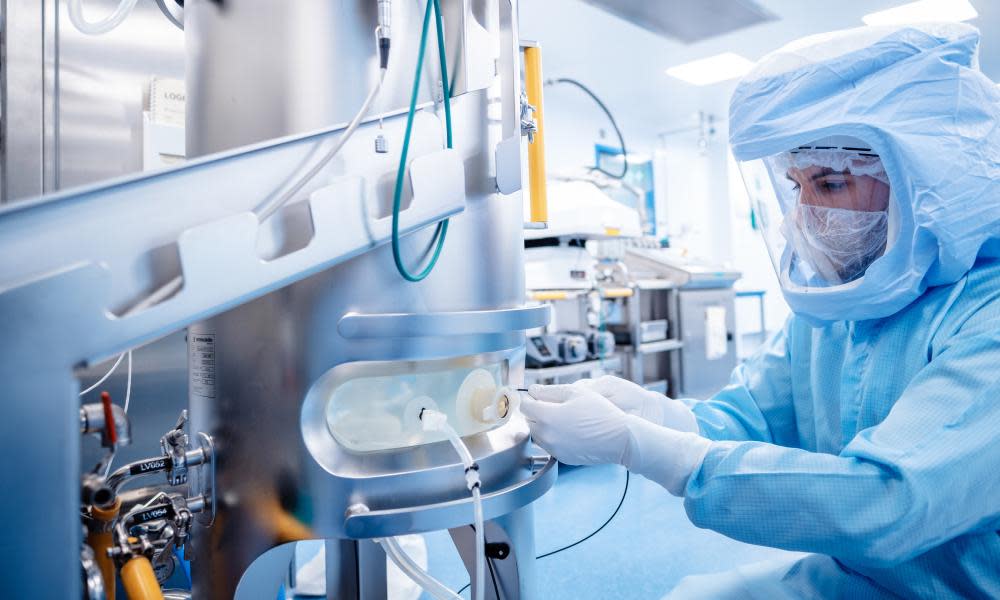Covid vaccines: what is patent waiving and will it solve the global shortage?

For those advocating for greater access to vaccines, it is a case of two cheers for Joe Biden. His administration’s decision to support a push at the World Trade Organization (WTO) to waive patents on Covid-19 vaccines may be a huge step towards ending vaccine inequity, campaigners say, but on its own it will not have a decisive effect on the health crisis.
What did the Biden administration agree to support?
Last October, fearing correctly that Covid-19 vaccine manufacturing would be dominated by wealthy countries, India and South Africa made a proposal at the World Trade Organization to waive patents on Covid-19 vaccines and other technology. It gained the support of more than 100 emerging countries, but has been opposed by a club of wealthier nations including the UK, Canada, Australia, the EU and, until now, the US.
The Biden administration has announced that it is changing its position, and will support waiving patents on Covid-19 vaccines – but not on treatments or other technology used to fight the disease.
If the waiver is adopted by the WTO, it would allow companies around the world that are developing Covid-19 vaccines to do so without fear that they might be sued by another entity that already holds the patent on the product.
Does the decision mean more vaccines?
Vaccine campaigners have praised the decision as “seismic” and heroic”, a potential precedent for waiving intellectual property (IP) to address health crises in the future. But they have also made clear that, alone, it is not going to address the global shortage of Covid-19 vaccines.
For one thing, the WTO has to actually adopt the waiver. The trade body usually operates by consensus, and key economies such as the UK, Canada and the EU continue to support upholding vaccine patents. The US turnaround might persuade these countries to compromise on the issue and strike some kind of agreement that is an improvement on the current situation, but does not entirely waive IP rights on vaccines.
Related: Welcome to the new colonialism: rich countries sitting on surplus vaccines | Akin Olla
Second, vaccines are extremely complex formulations. As we have seen throughout this year, even experienced companies are running into problems scaling up production. The manufacturing process is just as important as the patented “recipe”, and the WTO has no power to force companies such as Pfizer and Moderna to share the technology and knowledge that is used to produce their vaccines.
But national governments do have that power. The US could take the lead by pushing its pharmaceutical companies to share not just their patents but their technology and knowhow with manufacturers across the world. “It would not deliver more vaccines next week, but if they had done this a year ago, we would now have results,” says Ellen t’Hoen, a medical IP expert and campaigner.
As well, she says, sharing technology and expertise with manufacturers around the world will make it easier to produce and distribute vaccines to fight the future pandemics that scientists tell us are a near-certainty. “The world was not prepared for Covid-19, that’s what we are waking up to,” she says.
What does the pharmaceutical industry say?
Perhaps unsurprisingly, they are firmly against sharing patents that promise to make them tens of billions of dollars over the next years. But their trade organisation says its opposition is not about profit, but practicality.
“Waiving patents of Covid-19 vaccines will not increase production nor provide practical solutions needed to battle this global health crisis,” the International Federation of Pharmaceutical Manufacturers & Associations said in a statement.
The industry argues that companies have already shared technology with qualified partners around the world and could be producing billions of vaccines this year – enough to vaccinate the world – if governments helped them smooth out trade barriers and removed export controls on the raw ingredients required to produce doses. They say that wealthy countries are also hoarding vaccines, and if they agreed to give to share them more equitably, the crisis would be less acute.
More broadly, they have also argued that patent rights are crucial to spur innovation and investment that leads to new products. If a scientist fears their miracle drug or vaccine will be immediately produced for free by labs around the world, the argument goes, they will be less motivated to develop it.
But campaigners say there is plenty of evidence that even without the profit motive, scientists would still be driven to innovate. The Oxford/AstraZeneca vaccine was developed with at least 97% public and charitable funding, according to one study. The mRNA technology behind the Pfizer and Moderna vaccines was also funded for decades by taxpayers before being taken up by pharmaceutical companies.

 Yahoo Movies
Yahoo Movies 
